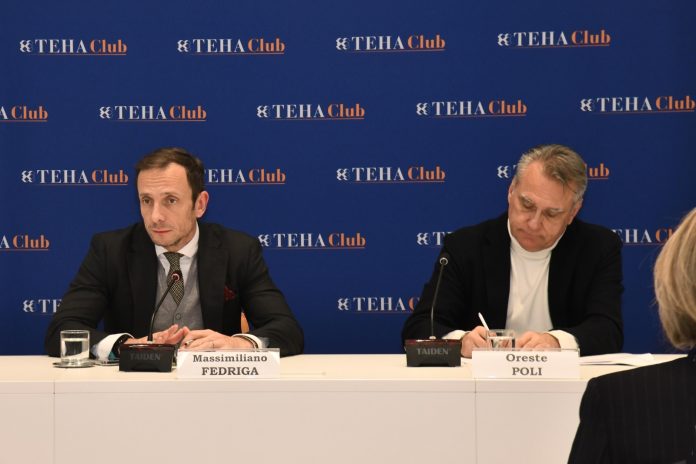by EH
Governor Massimiliano Fedriga of Friuli Venezia Giulia is positioning the northeastern Italian region as a key player on the global stage, with a focus on strengthening international alliances and advancing energy innovation.
Speaking to members of the TEHA Club at a meeting held today in Trieste’s historic Regional Government Building, Fedriga outlined the region’s foreign policy strategy, emphasizing the importance of fostering stable relationships with global powers. “Stability of alliances and political stability are the fundamental coordinates guiding Friuli Venezia Giulia’s actions, a region with growing international projection,” he said.
Fedriga highlighted the region’s strategic partnerships with the United States and Japan, while also turning his attention to India and the Middle East. The port of Trieste, Italy’s busiest by traffic volume, serves as a natural gateway for these regions. “We are building constant and lasting relationships with our privileged partners, the United States and Japan, but we are also looking at India and the Middle East, which are natural directions for the port,” he added.
The governor’s remarks were made during an event titled “Beyond Borders: Friuli Venezia Giulia’s Vision for a Strategic International Policy”, organized by The European House – Ambrosetti. The discussions unfolded against a backdrop of global instability, with Fedriga acknowledging the ongoing geopolitical tensions that are reshaping the world order. “We foresee a continuation of tensions and a sharper polarization between two opposing sides,” he noted.
In this context, Fedriga underscored the need for Italy’s regions to play an active role in securing national economic interests, particularly in the face of global supply chain disruptions. “It is crucial to protect our production chains by activating nearshoring initiatives to ensure essential components are available from neighboring countries,” he said. He singled out the Western Balkans as a critical area for growth in this regard, noting a recent meeting with Serbia’s Vojvodina region.
Fedriga also positioned Friuli Venezia Giulia as a key player in Italy’s broader international strategy, asserting that regional autonomy could offer a solution to national challenges. “The regions can bring added value,” he explained. “Our institutional stability makes us a valuable asset in a national framework that could benefit from differentiated autonomy alongside a strengthened premiership.”
As Europe grapples with the complexities of the energy transition, Fedriga also highlighted the region’s focus on sustainable energy solutions. Friuli Venezia Giulia has emerged as a leader in hydrogen innovation, seeking to balance the global shift toward electric vehicles with a long-term strategy to reduce reliance on external markets, particularly China. “The hydrogen economy, along with advancements in nuclear fusion, represents the future of energy innovation,” said Fedriga.
As Friuli Venezia Giulia charts its path forward, the region’s vision reflects a broader commitment to securing its place in a rapidly changing world, with a clear focus on strengthening alliances, securing economic independence, and leading the charge on energy innovation.





























